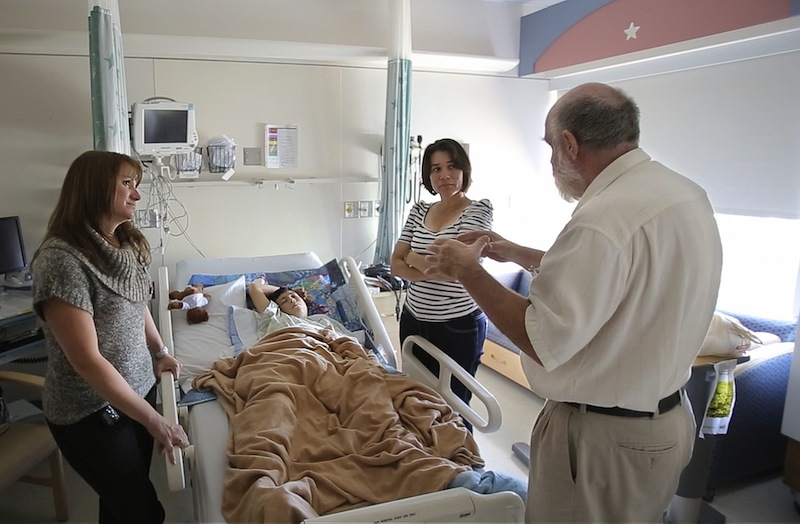The cost of free care provided by Maine hospitals to uninsured patients has more than doubled since 2007, and those expenses will continue to grow unless Medicaid expansion becomes law, hospital officials said.
Gov. Paul LePage on Monday vetoed a bill that would provide Medicaid health insurance coverage to tens of thousands of uninsured Mainers, something hospital officials said would significantly reduce their charity care expenses.
Democrats teamed with some Republicans to approve Medicaid expansion by a wide margin, but the bill passed a few votes short of the two-thirds supermajority that would now be needed to override LePage’s veto.
Supporters of the expansion still plan to attempt a veto override in the waning days of the legislative session despite the long odds of success.
For hospitals, it’s not only about more people having insurance. The Medicaid expansion would have a direct impact on their bottom lines.
Medicaid expansion would provide public health insurance to about 60,000 low-income Maine residents who are uninsured or about to become uninsured, and that would dramatically reduce free care expenses, a number of hospital officials and health care experts said.
That’s because when people without money or insurance go to a hospital for medical attention, they still receive care, but those free care or charity care costs end up as unreimbursed expenses on the hospitals’ balance sheets.
Maine hospitals provided $190 million in so-called charity care in 2011, according to the Maine Hospital Association.
Norm Belair, chief financial officer of Southern Maine Medical Center in Biddeford, said free care costs at SMMC increased in 2012 to $8 million, and are so far this year trending 20 percent higher than last year. The hospital could save more than $3 million if Maine expands Medicaid next year, he said.
If the state does not approve Medicaid expansion, the hospitals will continue to be saddled with ever-increasing free care expenses, as well as suffer financially from upcoming reductions in reimbursements under Medicare, the federal health insurance program for seniors.
“It’s the worst of all worlds for hospitals,” said Steve Trockman, a spokesman for Mid-Coast Health Services in Brunswick.
The substantial increase in free care since 2007 is the result of the recession and the state’s relaxing the eligibility requirements for patients to receive charity care, said Sara Gagne-Holmes, executive director of the health care advocacy group Maine Equal Justice Partners.
LePage vetoed Medicaid expansion on the heels of signing a separate bill to pay Maine’s hospitals $183.5 million that the state owed for past, unpaid Medicaid claims. LePage had made the hospital payment a top priority during the legislative session, but has said the state cannot afford to expand eligibility for the Medicaid program, which is called MaineCare in Maine.
A spokeswoman for LePage declined to comment on the Medicaid expansion issue Tuesday.
LePage is one of many conservative Republican governors who have blocked Medicaid expansion after opposing President Obama’s signature health care initiative, the 2010 Affordable Care Act.
Expansion of the insurance program is a key component in how the Affordable Care Act is intended to reduce the rolls of the uninsured. The additional insurance coverage would be paid for entirely by the federal government for 2014 to 2016, and states would be required to pay 10 percent of the costs in later years.
Hospital officials say the federal law assumes that states will approve the Medicaid expansion and reduce the charity care costs for their hospitals. That is supposed to protect hospitals from the costs of decreased Medicare reimbursements, which are also part of the law, officials said.
Other components of the Affordable Care Act make future hospital costs hard to predict.
One more complicating factor is how many uninsured people sign up for coverage through new health care exchanges that are slated to begin in 2014.
The exchanges will make insurance available to the self-employed, other individuals and small businesses with fewer than 50 employees. But how many will take advantage of the exchanges — and how that would affect the total number of uninsured — is unknown.
If Medicaid expansion is approved and new health care exchanges for individuals to purchase health care work as planned, free care and “bad debt” expenses would decline significantly, perhaps as much as 70 percent, according to Al Swallow, vice president and chief financial officer of Maine Medical Center in Portland. “Bad debt” is when patients can’t pay all or some of their bill, and Swallow said much of that debt, like free care, is also related to people being underinsured or uninsured.
Swallow cautioned that those savings are far from a sure thing, however. “I wouldn’t guarantee (the savings), and I wouldn’t budget for it,” he said.
Swallow also said any savings would be somewhat offset by cuts to Medicare and Medicaid reimbursements.
Michael Hachey, chief financial officer for Mercy Hospital in Portland, said he sees the financial costs and benefits of the law as “a wash.” But, he said, the hospital would prefer a Medicaid expansion rather than continuing to treat people who can’t pay any of their bills.
“Most people want to pay their bills, but they just can’t,” Hachey said. “It would be better for the system if more people had access to health care.”
Joe Lawlor can be contacted at 791-6376 or at:
jlawlor@mainetoday.com
Twitter: @joelawlorph
Send questions/comments to the editors.




Comments are no longer available on this story